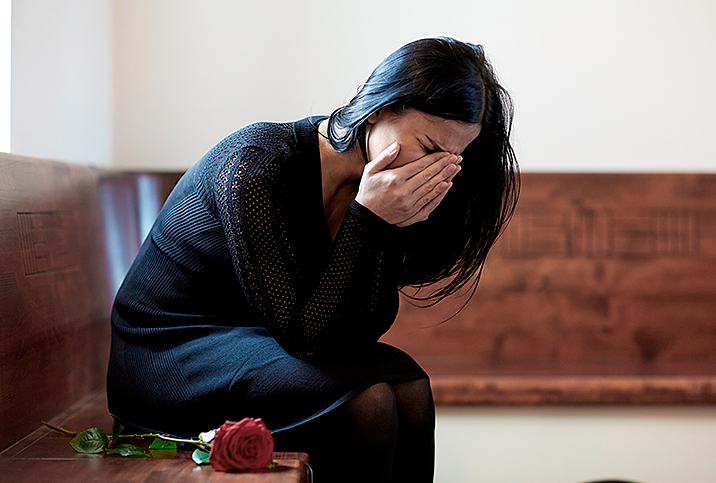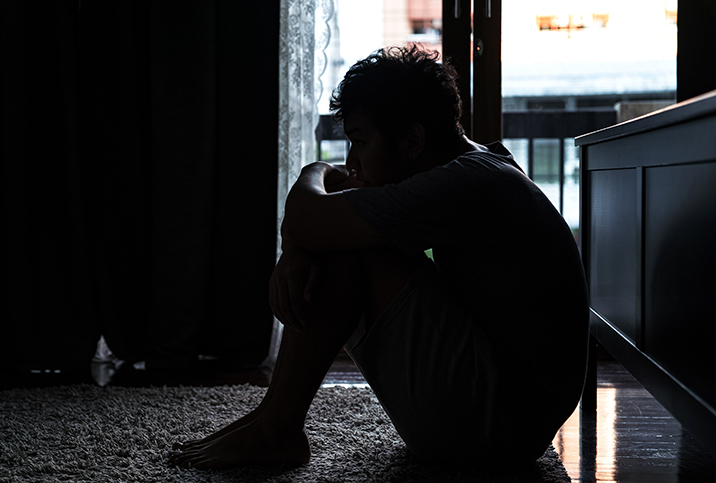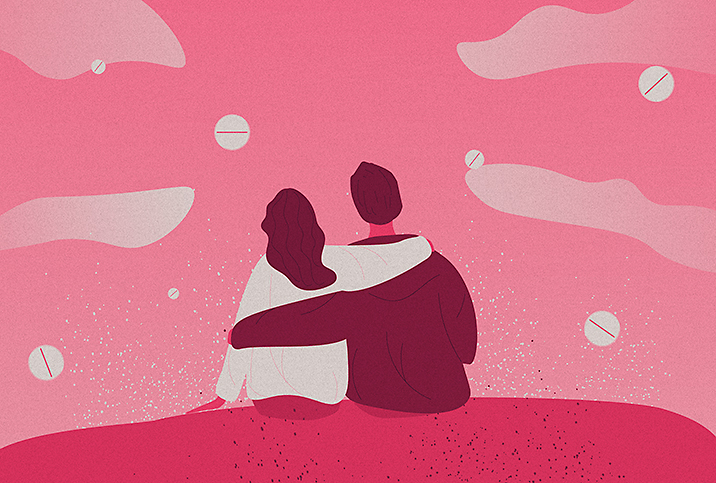All About Grief and Relationships

It was about a year and a half after my husband died when I started a relationship with the man I'd eventually marry. I told him the first week we were together, "I'm complicated. This won't be easy. And when it comes to my grief, I'm not going to hide it or pretend like it doesn't exist. I was with my husband for 18 years. He died in my arms. That doesn't just go away."
My new guy just said, "Okay."
Of course, I was right—"complicated" is about the only way to describe the two years that have passed since that day. But my second husband showed up and offered support in the ways I needed, and as time has passed and we've deepened our relationship, my grief and my needs have continued to change, and he, thankfully, has given me space to experience my feelings and the freedom to communicate them.
Grief is complicated. And trying to foster a relationship—of any kind—with someone who's grieving isn't an easy task. Often, relationships you envision remaining strong in the aftermath of loss ultimately falter, while new relationships find a way to grow.
Here are some pieces of advice that helped me manage my own grief.
Avoid comparison
Grief is grief, whether you lose your pet or your parents, and for anyone experiencing loss for the first time, it can be hard to imagine any pain deeper than what you're experiencing.
But the loss of a spouse or a child is a "next level" loss, and it's important to be cognizant that trying to offer support through comparison is largely unhelpful, regardless of the situation. Avoid saying things like, "Losing my grandma was one of the hardest things I've gone through, so I know what you're feeling," because it could sound hollow to someone who has lost a spouse or child—the type of loss is fundamentally different.
You only have to think about it. Someone who has lost a spouse or a child has to go to sleep every night with an empty bed in the house. They continue receiving correspondence or bills related to their loved ones. They have to cancel appointments that will never be rescheduled, file legal paperwork, change tax status, clear out clothing and throw away toothbrushes. They have to change their habits and create new goals because the person they shared life with intimately is gone.
While the deep-seated feelings of grief may be universal, the day-to-day nuts and bolts are often very different. As such, don't try to relate through comparison unless you have been through exactly the same type of loss. Instead, offer an open ear.
Remember the ring theory
If you share a relationship with the person who died, it's very important to keep the "ring theory" of grief in mind. This theory basically defines how to determine who you can lean on for support, and who you should be offering support to in the face of grief (or other crises).
Start by imagining the person who died as a circle. If you draw a ring around that circle, you would put the name of the person with the closest relationship to the deceased in the ring. Then if you draw a second ring around that circle, you would fill the second ring with the names of the next closest family members or friends to the deceased. You would continue drawing rings around each circle, filling each ring with the names of people with a slightly more distant emotional relationship to the deceased—old friends, coworkers, casual acquaintances and so forth.
Using this structure, determine where you fit in. For anyone who sits in a ring closer to the deceased than you do, you should offer support without looking for support in return. To receive support for your own grief, turn outward to those with more distant relationships than you had to discuss your feelings of loss.
If you share a ring, for instance, if you and a sibling both lost your mom? Try to offer support while also asking for support as needed. Bear in mind, though, the relationship you each had with your mom will be different, so you'll likely grieve differently and need different things to manage.
Be kind and understanding through this process. You may not be grieving in the same way, but that doesn't mean the loss isn't equally difficult for both of you. At the same time, you and your sibling may need different types of support, so speak up when you need to and ask what you can do to help, too.
Be patient with the process
No one grieves in exactly the same way, and grief can be confusing, especially for the person going through it. Strong reactions and emotions can seem to pop up without notice, and certain days, times or seasons may be particularly challenging for those suffering from a loss. Some of these may be expected—for instance, an anniversary or birthday—while others may not have an apparent rhyme or reason.
Try to be patient and supportive of the process. If your friend voices that a day is particularly challenging, ask if they'd like a listening ear, a distraction from the memories or space to be alone. Even if you don't like the person's answer, respect it. They'll know you're available and can be trusted to lean on and talk to when they're in a headspace to do so.
Don't assume that periods of sadness associated with their grief are dangerous or excessive.
One thing to keep in mind, though, is that if your friend tells you they need space, that doesn't mean forever.
"Be present and persistent," said Shagoon Maurya, a practicing counseling psychologist and psychotherapist and the founder of Safe Space. "Being there during someone's dark time and promising them to be there in the future can mean the world to someone. You can encourage them to get out of the house and help them with daily tasks, even when they don't seem open to much interaction."
Encourage outside support
One of the first things I did after my husband died was seek a therapist who specialized in grief and trauma. I knew I was out of my depth and wasn't going to be able to navigate the emotional toll my grief was wreaking on my system without outside support. It was quite possibly the best decision I made, as my therapist was able to give me resources and tools to address the mental health issues that arose in response to my loss.
Unfortunately, there are still stigmas about seeking therapy, and some people may need encouragement to take that step. If your loved one seems open to the idea of therapy but overwhelmed by the thought of trying to find a good therapist, offer to ask around for recommendations.
If you can help reduce the barriers for your grieving friend, they may be more likely to follow through. Just remember, it's not your job to be a therapist or a mental health professional, even if you have the training. It's your job to be a friend.
It's okay to offer support, but if you feel out of your league, encourage professional help.
Grief and depression are not the same things
Grief and depression sometimes appear the same—especially as both may involve deep feelings of sadness and result in coping mechanisms that appear withdrawn or isolated, or involve "self-treatment" with drugs or alcohol—but they're actually very different.
"Grief and depression share many similar symptoms that might cloud the difference between the two," Maurya explained. "Seeking treatment for depression can be lifesaving. On the other hand, grief due to some significant loss is not only normal, but can be healing in the long run."
Certainly, grief can lead to depression, and depression may be a part of the grieving process for some people, but the two states are not inherently linked. As you offer care and support to your loved one, don't assume that periods of sadness associated with their grief are dangerous or excessive.
There's no timeline
I once had someone very close to me say, "I can't believe I'm saying this…" (which should have been her cue to stop) "but it's been a year since Lance died, you should be better than you are."
I was floored and hurt, and really angry. Aside from the fact that I knew this friend had never lost anyone close to her, much less a husband, all I had "done" was admit out loud that I still didn't like being around other married couples. (To be honest,it was too hard to be in those situations where I was the anomaly everyone looked at with pity or some sort of weird "aww," exclaiming how great it was that I was "moving forward.")
My therapist, in discussing the situation, said, "Laura, you're doing great. I would be surprised if there still weren't situations 10 years from now that made you feel uncomfortable or that you still couldn't undertake."
There will be hard moments and bad days for the foreseeable future.
That's the reality of grief—it doesn't end. And someone who wants to engage in a relationship with a person who has suffered a major loss needs to recognize there will be hard moments and bad days for the foreseeable future.
Of course, that doesn't mean grief should always be the excuse, and certainly, a grieving person doesn't have carte blanche to use their grief to manipulate or disrespect the needs or feelings of others. But if your friend respectfully says, "I miss them today" or "This is hard for me because it's a reminder of my loss," this shouldn't make you feel less than or unimportant. Rather, it should make you feel good they were able to love someone else so completely, and that they would grieve the same for you, too.
Respect the spiritual connection
The death of a loved one rarely signifies the end of the spiritual connection that exists between the grieving and the grieved. It's incredibly common for animals, songs or locations to take on greater significance following a person's death.
Respect these newfound connections, even if you don't entirely understand them.
"Grief means connecting to hope and to the spiritual world to remind yourself of your loved one that has passed away, like a red cardinal flying or a white butterfly," said Katie Ziskind, a licensed marriage and family therapist and the owner of Wisdom Within Counseling in Niantic, Connecticut. "When you see these animals, you can think of your loved one and truly feel them next to you. Connecting to the spiritual world is very healing for survivors of grief and trauma."
Allow room for memories
Memorializing a lost loved one is an important part of the grief process.
Encourage your friend to share photos, create a memorial garden or set times to visit the gravesite regularly. The most natural way for your friend to prioritize their loved one may not make sense to you, or may not be how you would go about doing it, but understand everyone's process is different. Give space and understanding for the ways your friend needs to remember their lost love.
For me, I often share memories or the ways I'm continuing to grieve my husband on Facebook. I also prominently displayed photos of our relationship for the first few years after he died. But, when I met my current husband, over time, I decided to store most of those photos away out of respect for the life he and I are building together.
That said, I still display a photo of Lance and a photo of me in my wedding dress because these memories are important and the life we shared helped shape who I am today. My current husband gives me this space without question or concern because he knows that my love for him isn't less because I loved Lance.
In fact, I can love deeper and more fully because of my loss, my grief and my understanding that tomorrow isn't promised.


















